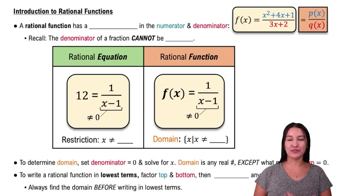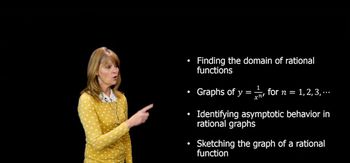5. Rational Functions
Introduction to Rational Functions
5. Rational Functions
Introduction to Rational Functions
Additional 3 creators.
Learn with other creators
Practice this topic
- Multiple Choice
Find the domain of the rational function. Then, write it in lowest terms.
774views1rank1comments - Multiple Choice
Find the domain of the rational function. Then, write it in lowest terms.
1040views4rank - Textbook Question
Provide a short answer to each question. What is the domain of the function ƒ(x)=1/x? What is its range?
967views - Textbook Question
Provide a short answer to each question. Is ƒ(x)=1/x2 an even or an odd function? What symmetry does its graph exhibit?
702views - Textbook Question
Find the domain of each rational function. f(x)=(x+7)/(x2+49)
1018views - Textbook Question
Use the graph of the rational function in the figure shown to complete each statement in Exercises 15–20.
As __
1220views




